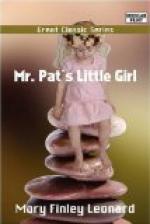Under the bridge the water rippled and splashed over the stones, and out of sight, back somewhere among the trees, it could be heard rushing over a dam. The children seated themselves on a bit of pebbly beach.
“How nice to be near the real country!” Rosalind exclaimed. “At home we are near the park, but that is not the real country. We have to go miles to get there.”
“But there are such lovely stores and things in the city,” said Katherine.
“Still, you can’t go about by yourself, as you can here,” Rosalind answered; and Belle added, “I like to go to the city for a little while, but I’d rather live in Friendship, where the houses aren’t so close together.”
As they sat there, throwing stones in the water and writing in the sand, Rosalind heard a great deal about school, which would close next week,—how the girls had rushed to the window to see her and had lost their recess, and how Belle had been sent to the office, besides, for making chalk dishes. It was all very amusing, but she could not understand why the girls wanted to see her.
“Well, you know they are all interested in your house, and in Miss Genevieve; and then everybody was surprised at your coming to visit your grandmother.”
“I can’t see why,” Rosalind said, opening her eyes.
“Oh, well—because you never had before, you know.” Belle’s manner was hesitating, as if she felt conscious of being on dangerous ground.
What she said was certainly true. Rosalind herself did not exactly understand it. She knew only that there had been some reason why her father had not visited his old home for many years. She wondered if these girls knew more about it than she.
“You see, you are something new,” Belle added, laughing. “Didn’t Miss Celia scold us that morning, Katherine?”
“Why, no, Belle, she didn’t exactly scold,” said Katherine.
“She didn’t throw back her head and frown and say ’Young ladies, I am amazed!’”—here Bell gave an excellent imitation of Mrs. Graham’s manner—“so you don’t call it scolding. She just said, ’Girls, I don’t know what to think!’ and we felt as mean! I love Miss Celia.”
“So do I,” echoed Katherine.
“Is she one of your teachers?” Rosalind asked.
“Yes; she is Miss Celia Fair. She teaches drawing and sometimes keeps study hour, and she is as sweet as she can be,” Belle concluded, with enthusiasm.
The name brought to mind one of Rosalind’s greatest puzzles,—the hillside, the young lady who looked as if she might be as Belle described her—sweet; the strange incident of the rose, and Aunt Genevieve’s words, “We have nothing to do with the Fairs.”
“I saw her once,” she remarked gravely.
“I forgot the Fairs and the Whittredges don’t speak. Perhaps you know about it,” said Belle.
Rosalind shook her head.
“I think it was about the will; wasn’t it, Katherine? Mrs. Whittredge wanted to break it because she thought Mr. Gilpin was crazy, but Dr. Fair said he wasn’t, and testified in court.”




